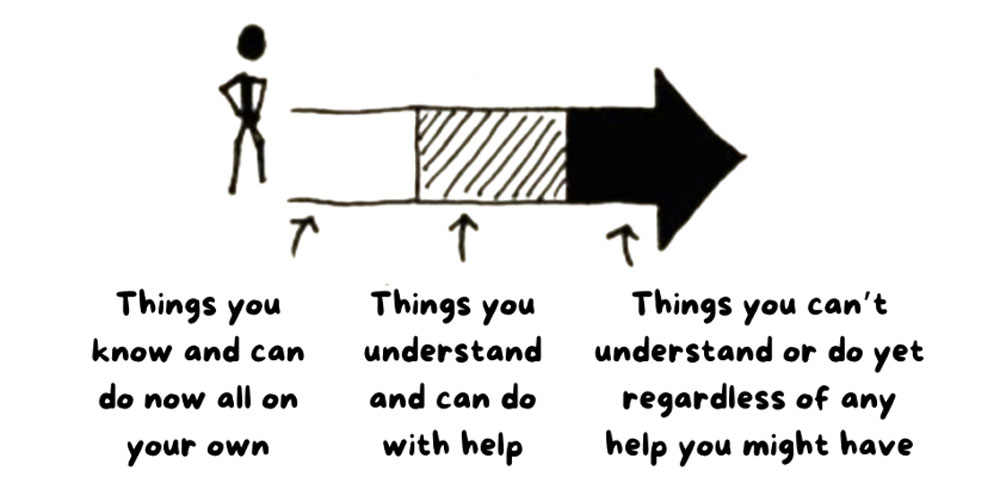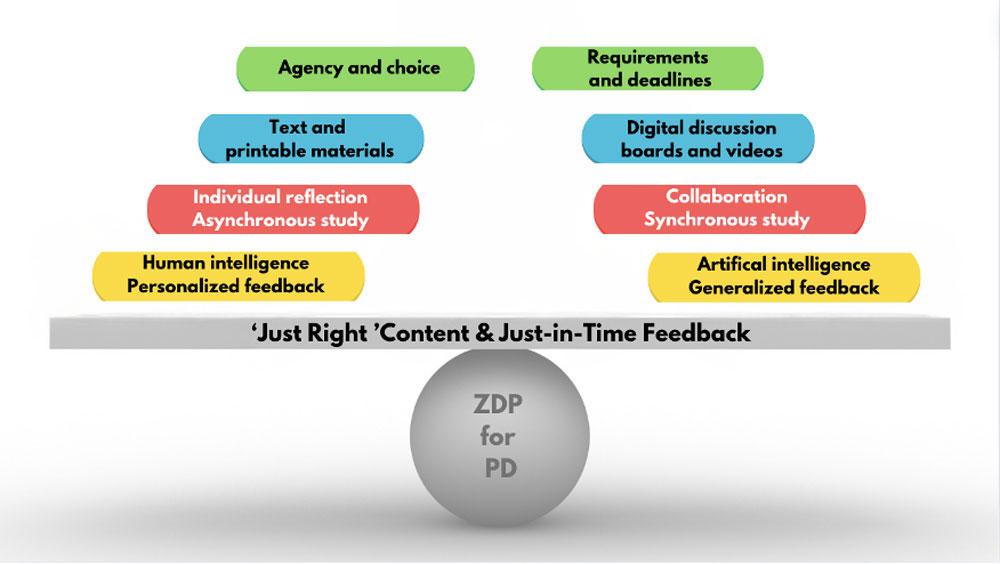
Effective professional development mirrors the key strategies that thoughtful teachers use with their students. Leading the recent Teacher Leader Institute (TLI) course, “Curriculum - The Heart of the Teacher Leader Role” was an exciting experience as it allowed me to incorporate such strategies with a large and diverse group of educators in a mainly asynchronous setting for the first time. As a former international school leader and a teacher at heart, I know that by tapping into Vygotsky’s insights on social and cultural learning, we can create dynamic, engaging, and impactful learning experiences for educators just as we do for our students. In this article, we’ll explore how leveraging the Zone of Proximal Development (ZPD) can elevate professional development, fostering a balance of challenge and support that leads to meaningful and sustainable growth.
The ZDP refers to a learner's ability to successfully complete tasks with the assistance of more capable individuals.

Professional competence and confidence increase when we identify and work within this dynamic, collaborative zone between current independent capabilities and potential growth through guided support and scaffolding.
From Theory to Practice: Applying Vygotsky’s Insights
Lev Vygotsky’s theories assert that learning is inherently social and cultural, building on existing frameworks when appropriately and actively engaged with new information. To create opportunities for professionals to learn effectively, we leverage our understanding of both psychology and pedagogy. By designing and implementing engaging courses such as those offered by the Principals’ Training Center (PTC) that include differentiation, collaboration, inquiry-based learning, and authentic experiences, we can maximize learning potential.
Designing Engaging Learning Experiences
Crucial elements for successful learning include incorporating dynamic prompts and questions, modeling, providing structures and protocols, and - even with a large number of participants - offering differentiated feedback. These strategies create opportunities for deeper engagement, grappling with complex issues, challenging assumptions, and analyzing diverse perspectives within the ZPD. Finally, we focus explicitly on developing transferable skills through our Job Embedded Practices tasks (professional development and learning activities that are integrated directly into teachers' daily work rather than being separate or scheduled events) and advocating for professional and ethical practices.Building Community in Asynchronous Learning Environments
One of the challenges in a mainly asynchronous course is building community, a sense of belonging, and connections essential for deep learning. Additionally, in busy schools, especially during hectic times of the year, structuring professional learning opportunities that allow for teacher agency and personal time management while keeping pace and motivation high is crucial. Starting with a synchronous session and instituting Regional Cohorts (a group of communities or individuals that share a geographic region and a common goal or purpose), for example, helped us to connect across the many miles separating us in what were the final months of school for most participants.
Balancing Learning Tools for Diverse Preferences
We worked hard to consider and balance individual preferences for various learning tools, utilize text resources with digital opportunities, discussion boards, video contributions, and virtual meetings. Furthermore, integrating artificial intelligence (AI) to support both the creation of assignments and the reflection on them enhanced the learning experience and allowed me to provide more differentiated feedback than would have otherwise been possible.Designing Effective Learning Experiences
Most importantly, we worked to design learning for professionals that reaffirms existing knowledge while connecting to “just right” next steps for developing understanding and skills. By providing “just in time” opportunities to apply new learning in meaningful ways, both individually and with colleagues, we could ensure relevant and impactful experiences in the ZPD zone.
Balancing Challenge and Support
Learning within the Zone of Proximal Development in leadership development requires balancing challenge and support as shown here:

(Photo source: Dr. Christine Orkisz Lang)
The reflective feedback we received from over 75 participants highlighted the elements that successfully achieved this balance:
“This course was the perfect mix of reflective practice and learning new material.”
“I liked the activities that I could do with my team. Those activities helped me to practice what I was learning in real time.”
“The information shared was new and relevant, allowing us to not only revisit our past learning but to cement it through new research.”
“The small check-in quizzes after learning about a concept were effective; they provided real examples in relevant contexts which were useful for checking my understanding. It was fantastic to learn in the ways we know are important for our students!”
Thank you, participants, for your helpful feedback!
Next Steps
Effective professional development is not just about imparting knowledge; it’s about creating a supportive and challenging environment that fosters growth and innovation. By incorporating Vygotsky’s principles and focusing on collaborative, inquiry-based learning, we can design professional development experiences that are engaging, relevant, and transformative. No matter which course you are considering next for your own professional learning or to support the next learning opportunity for colleagues that you may be designing, get into the zone for effective PD to ensure learning impact for you and others.
--------------------------------------------------------------
Christine Orkisz Lang’s work and research have focused on learning in inquiry-based contexts, where she has developed expertise in designing structures to support improved learning and well-being. She is an author of the original International Baccalaureate’s Primary Years Program (IB PYP), and her most recent school-based role was as the Primary School Principal at the Vienna International School. She has founded Core & More Education to support schools, leaders, teachers, and students using a focus on curriculum prioritization to address effective conceptual development, success criteria, and content overload as well as to increase staff and student agency. She holds a master's degree in education in mathematics and a doctorate in Linguistics/Inquiry-Based Learning; has taught primary and middle school students in United States of America, Austria, and international schools; and has supported university students, teachers, and leaders in various capacities for over 30 years.